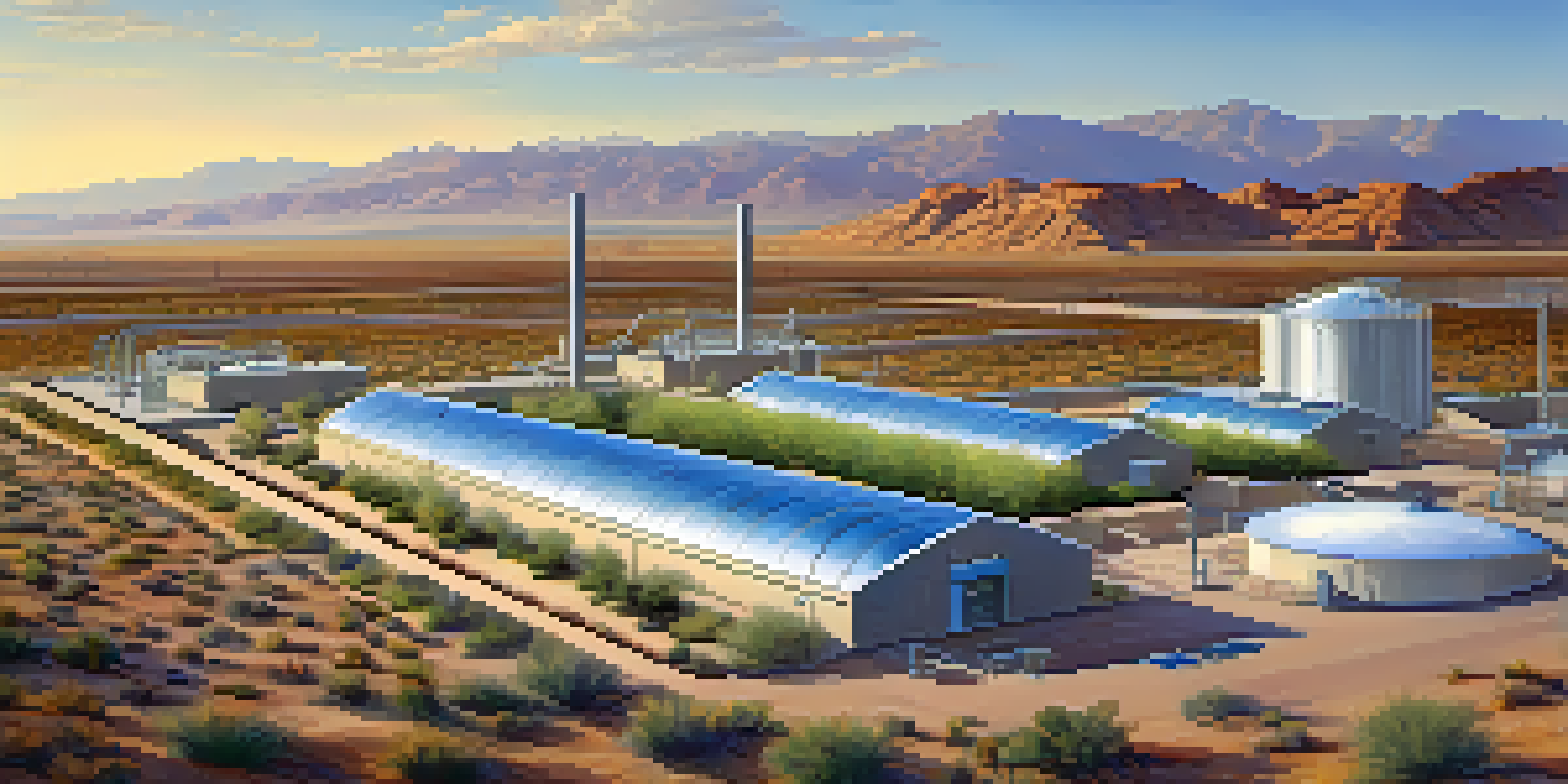Utilizing Wastewater: Sustainable Solutions for Arizona

Understanding Wastewater: A Resource, Not a Burden
Wastewater is often viewed as an environmental nuisance, but it can be a valuable resource. In Arizona, where water scarcity is a significant issue, finding sustainable solutions for wastewater management is crucial. By treating and reusing wastewater, we can conserve precious freshwater resources for future generations.
Water is the driving force of all nature.
This shift in perspective is vital, especially in arid regions like Arizona, where every drop counts. Treating wastewater involves processes that remove contaminants, making it safe for various applications. Think of it as turning what was once considered waste into a much-needed resource, much like recycling paper or plastic.
By embracing this concept, communities can reduce their reliance on dwindling natural water sources. Ultimately, utilizing wastewater isn't just about practicality; it's about rethinking our relationship with water and fostering sustainability in our ecosystem.
Current Wastewater Treatment Technologies in Arizona
Arizona is at the forefront of implementing advanced wastewater treatment technologies. Facilities across the state utilize methods like membrane bioreactors and reverse osmosis to ensure treated water meets safety standards. These technologies not only purify wastewater but also make it suitable for various uses, including irrigation and industrial processes.

For instance, the City of Phoenix has invested heavily in updating its treatment plants, allowing them to process millions of gallons of wastewater daily. This commitment reflects a growing awareness of the need for efficient water management strategies in the face of climate change and population growth.
Wastewater as a Valuable Resource
By treating and reusing wastewater, communities can conserve freshwater and create sustainable solutions, especially in water-scarce regions like Arizona.
By showcasing these innovations, Arizona is setting an example for other regions facing similar water scarcity challenges. The successful implementation of these technologies highlights the potential for wastewater to play a critical role in sustainable water solutions.
The Role of Reclaimed Water in Agriculture
One of the most significant applications of treated wastewater is in agriculture. Reclaimed water can be used to irrigate crops, providing farmers with a reliable water source even during droughts. In Arizona, where agriculture is a key industry, this practice helps to sustain crops while conserving valuable freshwater supplies.
The greatest threat to our planet is the belief that someone else will save it.
For example, the use of reclaimed water has enabled farmers to grow various crops, including fruits and vegetables, without stressing the already limited water resources. This not only ensures food security but also supports the local economy and reduces reliance on imported produce.
Additionally, using reclaimed water in agriculture can reduce the environmental impact of farming. It minimizes the need for chemical fertilizers, as treated wastewater often contains nutrients that can benefit plant growth. Thus, farmers can maintain healthy crops while promoting a more sustainable agricultural model.
Innovative Uses of Wastewater in Urban Settings
Urban areas are increasingly exploring innovative ways to utilize treated wastewater. In cities like Tucson, reclaimed water is used for landscaping, public parks, and even golf courses. This approach not only conserves potable water but also enhances green spaces within urban environments.
As urban populations continue to grow, the demand for water increases. By repurposing wastewater for non-potable uses, cities can alleviate some of the pressure on freshwater supplies. It's a win-win situation: urban residents enjoy beautiful parks, and water resources are managed more sustainably.
Innovative Treatment Technologies
Arizona's advanced wastewater treatment methods, such as membrane bioreactors and reverse osmosis, ensure safe water reuse for various applications.
Moreover, these initiatives often come with educational campaigns that raise awareness about water conservation. By engaging the community, cities can foster a culture of sustainability, encouraging residents to appreciate and participate in water-saving practices.
Challenges in Implementing Wastewater Solutions
Despite the benefits, there are challenges to implementing wastewater solutions in Arizona. Public perception often stands as a barrier, with some residents hesitant to accept reclaimed water for various uses. Overcoming this skepticism requires transparent communication and education about the safety and benefits of treated wastewater.
Additionally, the infrastructure needed for wastewater treatment and distribution can be costly and complex. Investments in technology and facilities are essential, but they require collaboration among government agencies, private sectors, and local communities to secure funding and support.
Ultimately, addressing these challenges is crucial for the successful integration of wastewater solutions. By fostering partnerships and promoting public understanding, Arizona can move towards a more sustainable water future.
The Economic Benefits of Wastewater Reuse
Utilizing wastewater can yield significant economic benefits for Arizona. By reducing reliance on expensive water imports and minimizing the costs associated with treating and disposing of wastewater, municipalities can save substantial amounts of money. These savings can then be redirected toward other essential services and infrastructure improvements.
Furthermore, the agricultural sector can benefit from reduced water costs, allowing farmers to maintain profitability even in times of drought. This not only supports food production but also strengthens the local economy and job market.
Economic Benefits of Water Reuse
Utilizing wastewater can lead to significant cost savings for municipalities and farmers, bolstering the local economy and creating new business opportunities.
Investing in wastewater reuse can also create new business opportunities, such as companies specializing in water treatment technologies. By fostering innovation in this field, Arizona can position itself as a leader in sustainable water management and attract businesses focused on environmental solutions.
Future Directions for Wastewater Management in Arizona
Looking ahead, Arizona has the opportunity to further enhance its wastewater management practices. Emerging technologies like decentralized treatment systems and advanced filtration methods promise even greater efficiency and safety in water reuse. These innovations can provide flexible solutions to communities, especially in rural areas where centralized systems may not be feasible.
Additionally, integrating wastewater management with broader water conservation strategies will be crucial. Policymakers should consider comprehensive approaches that encompass stormwater management, groundwater recharge, and sustainable land use practices. This holistic perspective can maximize water resources while minimizing environmental impacts.

Ultimately, the future of wastewater in Arizona depends on collaboration among stakeholders, including government, businesses, and the community. By working together, we can create a resilient water management system that ensures sustainability for generations to come.